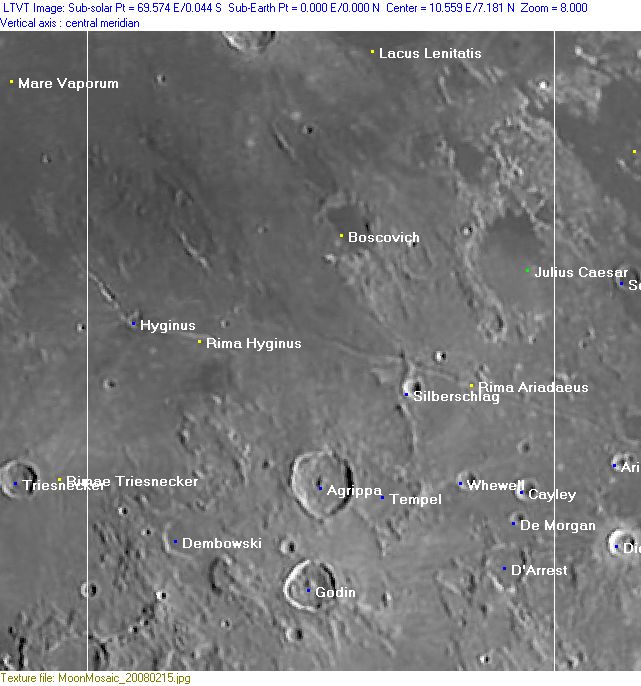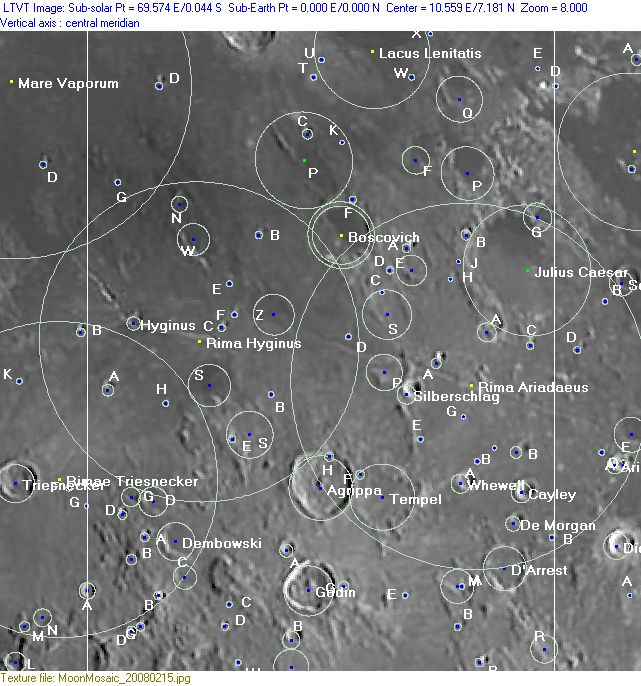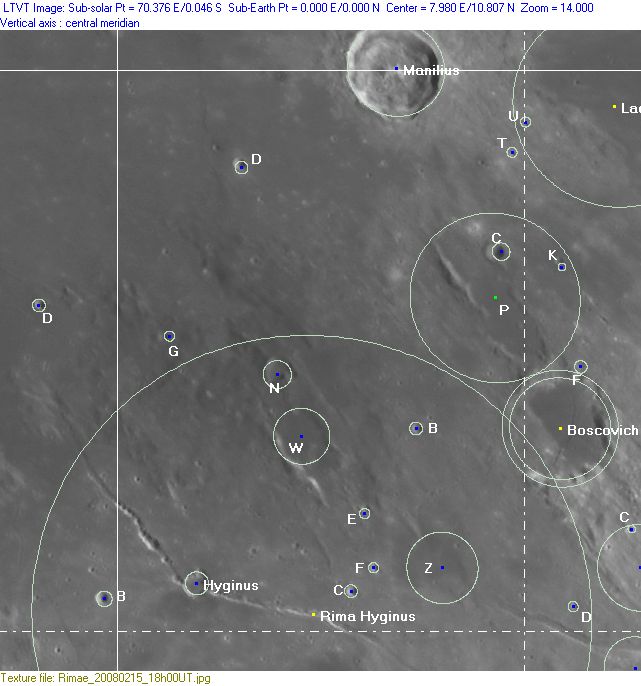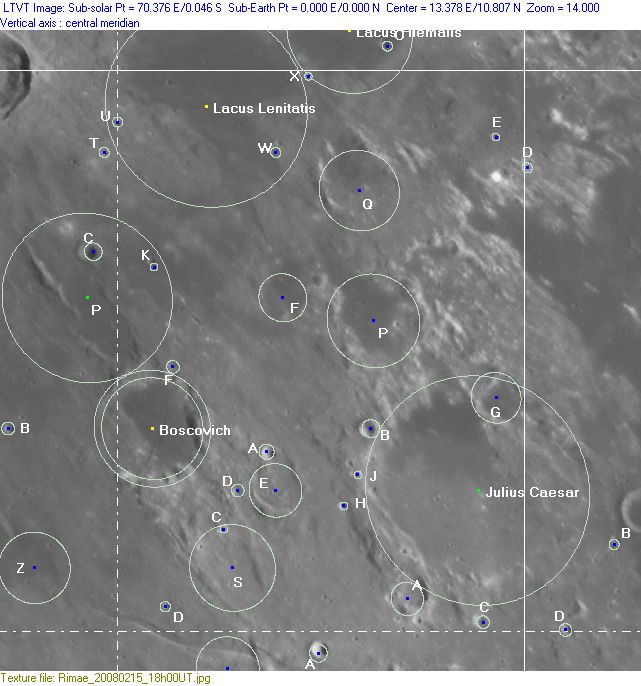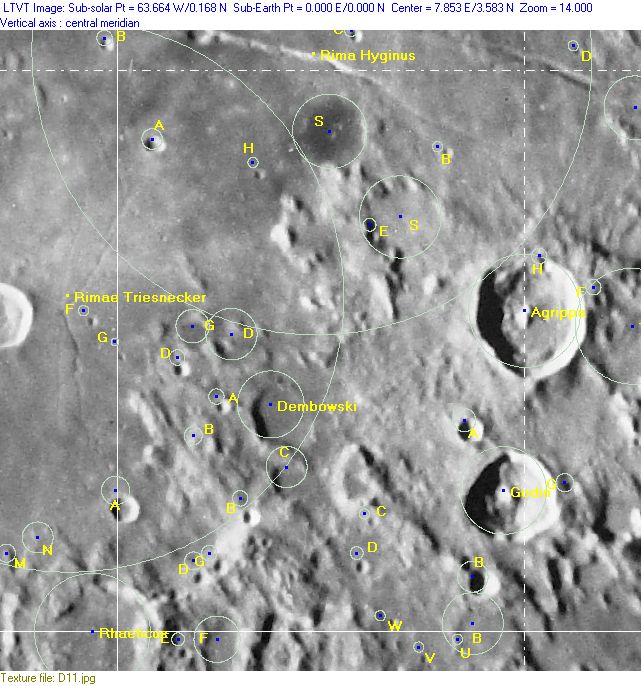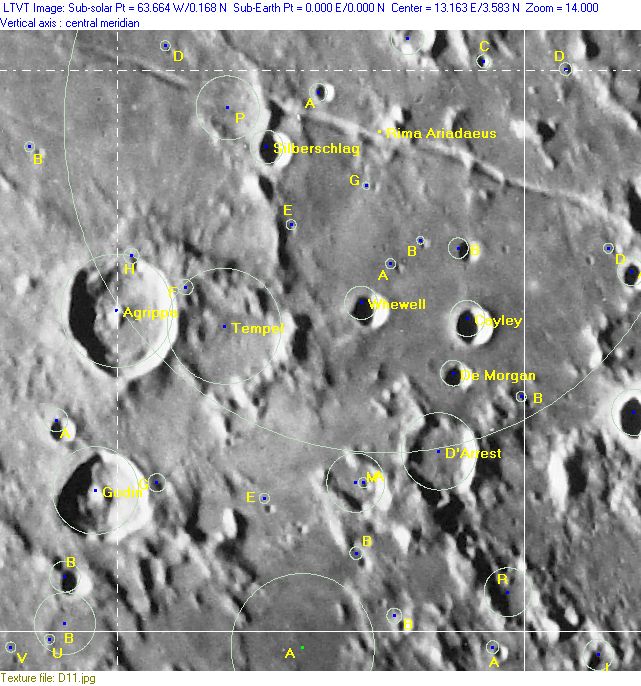Difference between revisions of "Rükl 34"
(Created page with "<div id="content_view" class="wiki" style="display: block"> =Rükl Zone 34 - HYGINUS= <br /> Neighboring maps on the [http://the-moon.us/wiki/R%C3%BCkl%20Index%20Map Rükl...") |
|||
| Line 2: | Line 2: | ||
=Rükl Zone 34 - HYGINUS= | =Rükl Zone 34 - HYGINUS= | ||
<br /> Neighboring maps on the [http://the-moon.us/wiki/R%C3%BCkl%20Index%20Map Rükl Nearside Map]:<br /> <div id="toc"> | <br /> Neighboring maps on the [http://the-moon.us/wiki/R%C3%BCkl%20Index%20Map Rükl Nearside Map]:<br /> <div id="toc"> | ||
| − | + | ||
| − | |||
{| class="wiki_table" | {| class="wiki_table" | ||
| | | | ||
| Line 83: | Line 82: | ||
<br /> | <br /> | ||
==Facula Caes, an exceptionally bright craterlet== | ==Facula Caes, an exceptionally bright craterlet== | ||
| − | Located near the upper right corner of this map is the officially unnamed high-albedo craterlet northwest of '''Sinus Honoris''' (Rukl 35) which is a noteworthy telescopic target during Full Moon (that craterlet looks very much like a "star"). It was photographed by the orbiting astronauts of Apollo 15 in the summer of 1971. In fact, there's nothing special to say about it whenever the LRO's extreme close ups are examinated (it's just a common bowl shaped high-albedo craterlet), but... it looks conspicuous during Full Moon! (there's a compact ejectablanket around that craterlet, looking like a very young, dense and bright ''nebula'').<br /> <span class="membersnap">- | + | Located near the upper right corner of this map is the officially unnamed high-albedo craterlet northwest of '''Sinus Honoris''' (Rukl 35) which is a noteworthy telescopic target during Full Moon (that craterlet looks very much like a "star"). It was photographed by the orbiting astronauts of Apollo 15 in the summer of 1971. In fact, there's nothing special to say about it whenever the LRO's extreme close ups are examinated (it's just a common bowl shaped high-albedo craterlet), but... it looks conspicuous during Full Moon! (there's a compact ejectablanket around that craterlet, looking like a very young, dense and bright ''nebula'').<br /> <span class="membersnap">- DannyCaes <small>Sep 12, 2015</small></span><br /> |
---- | ---- | ||
| − | + | </div> | |
Revision as of 16:48, 15 April 2018
Contents
Rükl Zone 34 - HYGINUS
Neighboring maps on the Rükl Nearside Map:
| 34 |
||
Photographic Map
(This map is based on an Earth-based photograph that has been computer-corrected to zero libration. The vertical white lines indicate the left and right boundaries of the Rükl rectangle)
Background image source
Named Features
- Agrippa (Van Langren's Urselli, J.Hewelcke's Mons Ida).
- Boscovich (Van Langren's Taye, J.Hewelcke's Collis Aconitus).
- Cayley
- Cayley's mob (a nickname from D.Caes for a cluster of craterlets between Cayley and Rima Ariadaeus).
- D'Arrest (J.Hewelcke's Mons Horminius).
- De Morgan
- Dembowski (J.Hewelcke's Mons Mysius) (note the odd table-mountain like elevation immediately southeast of Dembowski!) (unofficially called Dembowski Mensa by D.Caes).
- Dorsum Manilius D (an unofficial name from D.Caes for the wrinkle ridge north-northwest of the bowl shaped crater Manilius D in the eastern part of Mare Vaporum, west of Manilius).
- Facula Caes (an unofficial name from D.Caes for the exceptionally bright craterlet near the northwestern end of Sinus Honoris, see upper right corner of Chart 34, and Additional Information below).
- Godin (Van Langren's Bekii, J.Hewelcke's Mons Ida).
- Hyginus
- Hyginus Nova (H.Klein's disallowed name for the mysterious formation which was once known as Hyginus N, a so-called new crater).
- Julius Caesar (Van Langren's Ocariz, J.Hewelcke's Palus Archerusia).
- Lacus Lenitatis
- Manilius (Van Langren's Isabellae Reg. Hisp., J.Hewelcke's Insula Besbicus) (this is the pronounced crater at the upper margin of Chart 34).
- Rima Ariadaeus
- Rima Hyginus
- Rima Pau (K.C.Pau's unofficial name for a rille just south of Manilius).
- Rimae Boscovich
- Schneckenberg (a well-known discontinued IAU name for the more-or-less snail shaped formation north of Hyginus).
- Silberschlag
- Silberschlag range (T.G.Elger's name for the mountains north of Silberschlag).
- Sinus Propontis (J.Hewelcke's disallowed name for the southern part of Mare Vaporum).
- Tempel
- Terra Dignitatis (Van Langren's disallowed name for the whole of Chart 34).
- Terra Sanitatis (Riccioli's discontinued name for almost the whole of Chart 34, sans Mare Vaporum at upper left).
- Whewell
Lettered Crater Locations
(click on the thumbnails to display full-sized images; use browser BACK button to return - the dashed white lines are the midpoints of the Rükl zones)
Full zone with lettered craters:
Lettered craters by quadrants:
| North West |
North East |
| South West |
South East |
Additional Information
- Other online descriptions of features in this Rükl map section:
Facula Caes, an exceptionally bright craterlet
Located near the upper right corner of this map is the officially unnamed high-albedo craterlet northwest of Sinus Honoris (Rukl 35) which is a noteworthy telescopic target during Full Moon (that craterlet looks very much like a "star"). It was photographed by the orbiting astronauts of Apollo 15 in the summer of 1971. In fact, there's nothing special to say about it whenever the LRO's extreme close ups are examinated (it's just a common bowl shaped high-albedo craterlet), but... it looks conspicuous during Full Moon! (there's a compact ejectablanket around that craterlet, looking like a very young, dense and bright nebula).
- DannyCaes Sep 12, 2015
